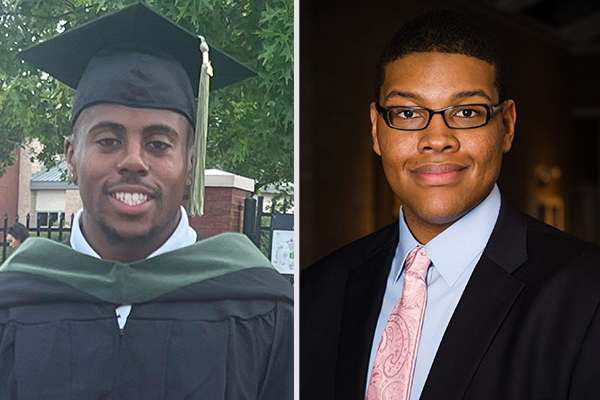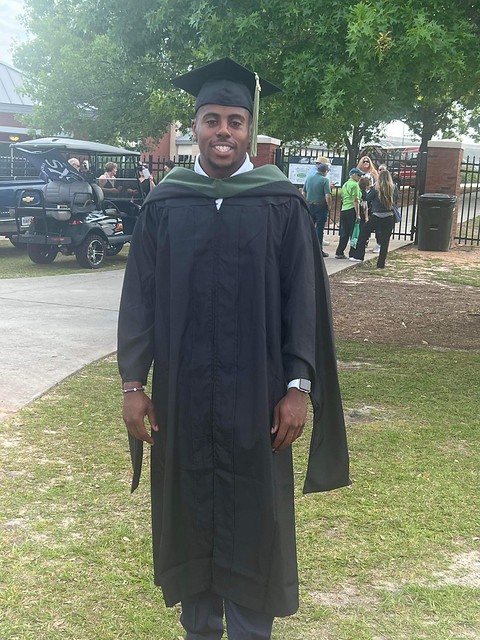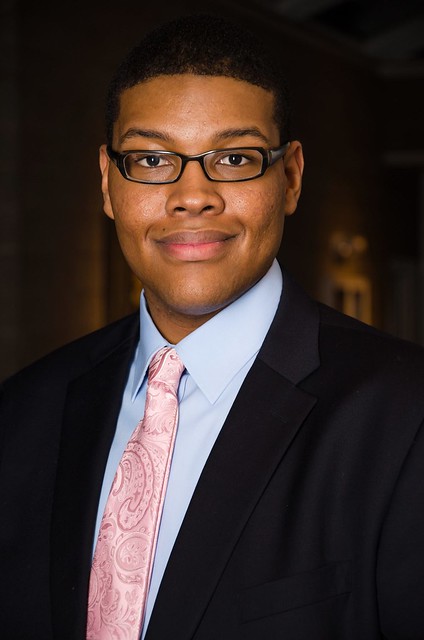Auburn’s College of Education welcoming two Presidential Graduate Opportunity Program fellows for fall 2023 semester
Article body
Two students will be joining the College of Education this fall as part of Auburn University’s Presidential Graduate Opportunity Program, or PGOP.
Derick Anglin and Tamarceo Shaw have been accepted for the highly competitive fellowship. Anglin will pursue a doctorate in kinesiology, and Shaw will pursue a doctorate in music education.
Anglin said coming to Auburn for his doctoral degree will allow him to expand his knowledge on muscle physiology — specifically, he will continue his studies under the mentorship of Professor Michael Roberts, director of the Nutrabolt Applied and Molecular Physiology Laboratory.
“With nutrition being a big aspect of my life, I want to also assist with researching the effects of nutritional supplements on whole-body and muscle physiology,” Anglin said. “Researching skeletal muscles and adaptations has always been a passion of mine.”
Roberts said he met with Anglin two years ago when he expressed an interest in joining Auburn’s School of Kinesiology for his doctorate and, specifically, studying under Roberts.
“Derick has experience with Dr. JohnEric Smith at Mississippi State as an undergraduate researcher,” Roberts said. “During this time, Derick became proficient in techniques involving wearable technologies during exercise. These techniques would serve great utility in the School of Kinesiology, and him being able to execute them would provide a ‘value-added’ proposition for the lab and school as a whole.”
Roberts also noted Anglin’s regular attendance at scientific conferences, where he presents data that he has collected.
“This experience is invaluable and would easily translate into our school’s active presence at scientific meetings,” Roberts said.
Shaw has pursued research pedagogy since he experienced issues with his vocal folds as an undergraduate student.
“These problems prompted me to seek help from a laryngologist and speech-language pathologist, or SLP,” Shaw said. “My vocal folds were inflamed, and I went through several speech therapy sessions with an SLP. These sessions gave me many tools that I still use today for voice care. It is essential for singers to understand the basic function of the voice and how to care for it.
“My love of vocal pedagogy and vocal health started with working with an SLP. This experience sparked my passion for wanting to work with other vocal music educators and helping them with assisting their students in achieving their full vocal potential.”
One of Shaw’s research goals in the Vocal Music Education program is to continue working on his teaching manual for vocal music educators. This will serve as a teaching guide for music educators without an extensive background in vocal pedagogy or whose primary instrument is not voice.
“My long-term goal is to open a music school that will serve underrepresented and low-income students,” he said. “I grew up in a low-income household, and I understand that enrolling your child in music lessons can be a financial burden. However, I don't want the lack of money to be the reason why students choose not to study music.”
Shaw’s mentor, Jane Kuehne, an associate professor of music education and graduate program officer in the Department of Curriculum and Teaching, said Shaw will be an exceptional addition to Auburn’s Music Education program as an advocate and champion for all students.
“He has unique perspectives about music education that I strongly believe are needed in our profession,” she said. “Tamarceo is a first-generation, African American college student. He has worked for everything he has gained, and his successes come from his work ethic and drive for excellence, his drive to learn and grow — to constantly learn and constantly grow.”
PGOP fellowships are awarded for three years and are part of programming and related efforts to enhance Auburn’s research and scholarly profile, as well as diversity and inclusion in the graduate student population.
“Receiving the Presidential Graduate Opportunity Program fellowship will not only serve Derick and Tamarceo, but will help further Auburn University’s goal of cultivating a rich and diverse student community while also improving access, affordability and academic quality,” said Jeffrey T. Fairbrother, dean of the College of Education and Wayne T. Smith Distinguished Professor. “These students are exceptional and will contribute greatly to the mission of our college, including through engagement in impactful research and meaningful outreach.”
Anglin received his Bachelor of Science in clinical exercise physiology from Mississippi State University in Starkville, Mississippi, where he was recognized as the Exercise Undergraduate of the Year. He also recently completed his Master of Science in exercise science from Georgia Southern University in Statesboro, Georgia.
Anglin said the experience in his academic career, including research, review and co-authoring, has prepared him for this opportunity at Auburn.
“To be selected for the Presidential Graduate Opportunity Program Fellowship is a thrilling and wonderful opportunity,” he said.
Shaw completed a bachelor’s in music (voice) from Simpson College in Indianola, Iowa, and a Master of Music degree in vocal performance from Austin Peay State University in Clarksville, Tennessee. He also earned an Education Specialist in vocal music education in December 2022 from Auburn.
“Vocal music has played an essential role in my life, and I have been able to teach some of the world’s finest musicians over the past few years,” he said. “I believe that all students deserve a high-quality music education. I am honored to be a recipient of the Presidential Graduate Opportunity Program Fellowship and believe an Auburn education will help me to become a stronger educator and leader in this field.”
Related Media
Media interested in this story can contact Communications Director Preston Sparks at (334) 844-9999 or preston.sparks@auburn.edu.
Auburn University is a nationally ranked land grant institution recognized for its commitment to world-class scholarship, interdisciplinary research with an elite, top-tier Carnegie R1 classification, life-changing outreach with Carnegie’s Community Engagement designation and an undergraduate education experience second to none. Auburn is home to more than 30,000 students, and its faculty and research partners collaborate to develop and deliver meaningful scholarship, science and technology-based advancements that meet pressing regional, national and global needs. Auburn’s commitment to active student engagement, professional success and public/private partnership drives a growing reputation for outreach and extension that delivers broad economic, health and societal impact.







